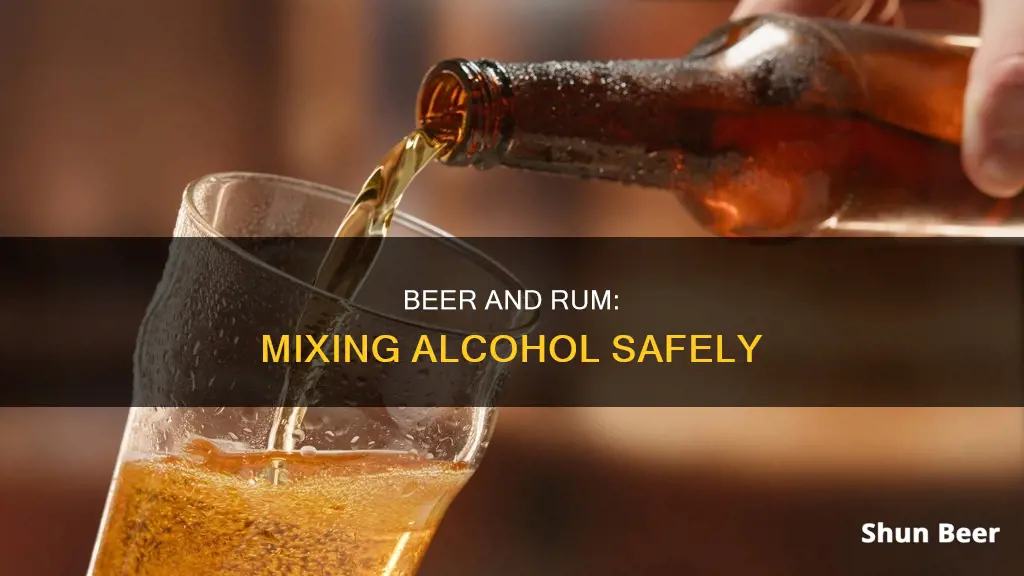
There are many theories about drinking beer after rum or vice versa. The most common saying is beer before liquor, never been sicker; liquor before beer, you're in the clear. This saying refers to the idea that you can avoid a hangover by drinking your beverages in a specific order. However, there is little scientific evidence to support this claim. According to a study published in the American Journal of Clinical Nutrition, changing the order of drinks had little to no effect on the severity of hangovers. The amount of alcohol consumed and individual factors such as genetics, smoking, and eating habits, play a more significant role in determining the likelihood and severity of a hangover.
| Characteristics | Values |
|---|---|
| Can I drink beer after rum? | Yes, but it may not be advisable to mix different types of alcohol. |
| Does drinking order matter? | No, it is a myth. What matters is the amount of alcohol consumed and the rate of consumption. |
| What about drinking beer before liquor? | The saying goes, "Beer before liquor, never been sicker; liquor before beer, you're in the clear." However, there is no scientific basis for this. |
| What affects the risk of a hangover? | Factors include the amount of alcohol, drinking on an empty stomach, frequency of drinking, genetics, congeners, and smoking. |
What You'll Learn

The order of drinks does not affect hangover severity
There is a common belief that the order in which you consume alcoholic drinks can influence the severity of a hangover. This belief is encapsulated in the saying, "Beer before liquor, never been sicker; liquor before beer, you're in the clear." However, scientific evidence suggests that the order of drinks does not have a significant impact on hangover severity.
The idea that drinking beer before liquor can make you "sicker" is widely regarded as a myth. While it is a well-known phrase, there is little scientific basis to support it. The severity of a hangover is determined by various factors, but the order of drinks is not one of them. The saying likely originated from the way people typically progress from drinking beer to liquor during an evening, and if they get sick, they attribute it to the last drink they had.
A study published in the American Journal of Clinical Nutrition set out to test this belief. The experiment involved 90 participants divided into three groups, with factors such as size, age, and gender considered. One group consumed beer followed by wine, the second group had the same drinks but in the opposite order, and the third group drank only beer or wine, ensuring matching alcohol levels. The groups then switched orders a week later.
The results of the study showed that changing the order of drinks made little to no difference in the severity of hangover symptoms, as measured by the Acute Hangover Scale (AHS) rating. This finding contradicts the popular belief that drinking beer before liquor will make you "never been sicker."
So, while the order of drinks may not affect hangover severity, what are the factors that do influence how terrible you feel the morning after? Well, it's primarily about how much you drink and how quickly you drink it. The amount of alcohol consumed is a key determinant of hangover severity. Drinking too much, too quickly, can lead to higher blood alcohol levels, which are more likely to induce a hangover. Additionally, drinking on an empty stomach can worsen the side effects of alcohol consumption and increase the speed at which alcohol is absorbed into the body.
In conclusion, while the saying "beer before liquor, never been sicker" has persisted for a long time, it is largely a myth. The order of drinks does not affect hangover severity. Instead, it is the total amount of alcohol consumed and the rate at which it is consumed that are the main factors influencing how terrible you feel the morning after. So, if you're looking to avoid a hangover, focus on pacing yourself and drinking in moderation rather than worrying about the order of your drinks.
HIV and Alcohol: Is Drinking Beer Safe?
You may want to see also

Drinking pace and amount are more important than order
There is a common saying that goes, "Beer before liquor, never been sicker; liquor before beer, you're in the clear." This implies that drinking beer after rum or any liquor will make you sick. However, this is just a myth, and the order in which you consume your drinks is unlikely to influence whether you experience a hangover or get sick.
The idea that drinking beer after rum will make you sick is not supported by scientific evidence. A study published in the American Journal of Clinical Nutrition found that changing the order of drinks had little to no effect on the severity of hangover symptoms. The important factor in avoiding a hangover is not the order of drinks but rather the pace and amount consumed.
Drinking pace and amount are crucial factors in determining the severity of a hangover. Alcohol is absorbed into the bloodstream as soon as it reaches the stomach, and high blood alcohol levels are more likely to induce a hangover. Therefore, drinking too much alcohol too quickly, regardless of the order, can lead to a hangover.
To avoid a hangover, it is essential to drink in moderation and pace yourself. Starting with lower-calorie and lower-alcohol-content drinks can help monitor the amount of alcohol entering your system. Alternating alcoholic beverages with water can also help reduce the risk of a hangover. Additionally, eating before drinking can slow down the absorption of alcohol and help prevent a hangover.
In conclusion, when it comes to drinking beer after rum, the order of drinks is not as important as the pace and amount consumed. To avoid a hangover, focus on drinking in moderation, pacing yourself, and staying hydrated.
Beer and IBS: What You Need to Know
You may want to see also

Carbonated drinks irritate the stomach lining
Drinking beer after rum is unlikely to make you feel sicker than drinking them in the opposite order. However, drinking carbonated drinks, such as beer, can irritate the stomach lining.
Carbonated drinks are known to cause digestive issues, including stomach pain, bloating, and gas. This is due to the carbonation, which introduces air into the stomach, similar to eating or drinking too fast. The carbonation can also alter the pH levels in the body and increase pressure in the stomach and intestines. In addition, carbonated drinks can be high in sodium and contain artificial sweeteners, which can cause stomach pain and inflammation in the gut.
The effects of carbonation on the stomach appear to be related to both mechanical and chemical effects. Symptoms of gastric mechanical distress only appear when drinking more than 300 ml of a carbonated fluid. However, even smaller amounts of carbonated drinks can cause bloating, as the carbon dioxide increases gastric volume, leading to feelings of fullness.
The pain receptors in the body may also detect carbonation as pain. This can be exacerbated by the temperature of the drink, as cold carbonation is more likely to be registered as pain by the body's pain receptors.
Furthermore, carbonated drinks can contain additives such as sugar and caffeine, which can have negative health effects, especially for people with irritable bowel syndrome (IBS). Sugary sodas are linked to weight gain, diabetes, and other health issues. Artificial sweeteners in diet sodas can also cause a laxative effect, leading to diarrhea.
While the order in which alcoholic drinks are consumed does not appear to affect the likelihood of a hangover, other factors such as the amount of alcohol consumed, whether food was consumed beforehand, and genetics can influence the risk of experiencing a hangover.
The Beer Bug Mystery: How Does It Work?
You may want to see also

Alcohol is absorbed as soon as it reaches the stomach
Whether you drink beer after rum or vice versa, the order of drinks is unlikely to influence whether you experience a hangover. This is because alcohol is absorbed into the bloodstream as soon as it reaches the stomach. Thus, all the alcohol you drank the night before will have been absorbed long before your hangover takes effect.
Alcohol (ethanol) is a small, water-soluble molecule that is relatively slowly absorbed from the stomach and more rapidly absorbed from the small intestine. It is then freely distributed throughout the body. The pleasurable effects of alcohol are best achieved when drinking with a meal or when alcohol is consumed diluted in the case of spirits.
The rate of alcohol absorption depends on several factors. It is quickest when alcohol is consumed on an empty stomach and when the concentration of alcohol is 20-30%. Drinks with a lower alcohol percentage, such as beer, will increase blood alcohol levels more slowly than drinks with a higher percentage, such as spirits. However, drinks with a very high alcohol content may delay gastric emptying and inhibit absorption.
Food, especially carbohydrates and proteins, slow down the rate of intoxication by preventing alcohol from passing into the small intestine too quickly. The longer the alcohol stays in the stomach, the slower the onset of its effects. Carbonated drinks, such as whisky and soda or champagne, enter the system quicker and will generally have an effect sooner.
Beer After a Workout: Good or Bad Idea?
You may want to see also

Congeners in dark drinks worsen hangovers
The saying goes, "beer before liquor, never been sicker; liquor before beer, you're in the clear." This implies that drinking beer after rum may not be advisable. However, the order of drinks is not the only factor that determines the severity of a hangover. One factor that has been scientifically proven to influence hangovers is congeners.
Congeners are compounds found in alcoholic drinks that are produced during the distillation or fermentation process. They give drinks their distinct taste and aroma, and dark-coloured drinks tend to have higher congener levels than lighter-coloured drinks. Examples of congeners include acetaldehyde, which gives a fruity smell to rums and bourbons, and isobutylene alcohol, which has a sweet smell.
Research has shown that congeners may be responsible for causing more intense hangovers. A 2010 study found that participants who consumed bourbon, a drink high in congeners, experienced more severe hangovers compared to those who drank vodka, which has a lower congener content. Additionally, congeners may compete with ethanol breakdown in the body, causing alcohol and its byproducts to remain in the body for longer, contributing to prolonged hangover symptoms.
Drinks such as tequila, cognac, whiskey, brandy, rum, darker beer, and red wine are high in congeners. On the other hand, clear drinks like white wine, light rum, light beer, gin, and sake are low in congeners.
To reduce the likelihood and severity of a hangover, it is advisable to limit the consumption of dark alcohol, opt for store-bought instead of homemade drinks, avoid drinking on an empty stomach, stay hydrated by drinking water, and get adequate sleep.
Beer Drinking and Heart Rate: What's the Connection?
You may want to see also
Frequently asked questions
Yes, you can drink beer after drinking rum. However, it is important to remember that drinking too much alcohol, regardless of the type or order, can lead to negative consequences such as hangovers and vomiting.
To avoid a hangover, it is recommended to focus on pacing and moderation. Drinking water between alcoholic beverages and staying hydrated before bed can also help prevent hangover symptoms.
According to a study published in the American Journal of Clinical Nutrition, the order of drinks does not affect the severity of a hangover. However, starting with liquor and transitioning to beer may help with pacing, as liquor has a higher alcohol content and will lower your inhibitions more quickly.







